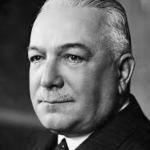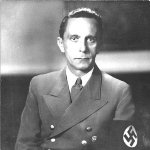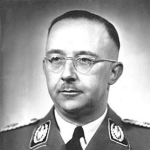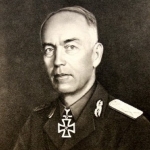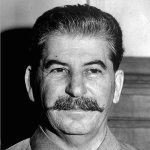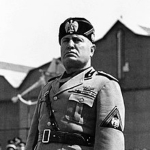Background
Joachim von Ribbentrop was born in Wesel, Germany, on 30th April, 1893. His parents were Richard Ulrich Friedrich Joachim Ribbentrop, a career army officer, and his wife Johanne Sophie Hertwig.


1937
From left to right, Edward Wood, 1st Earl of Halifax (1881 - 1959), Charles Edward, Duke of Saxe-Coburg and Gotha (1884 - 1954), and German Ambassador Joachim von Ribbentrop (1893 - 1946) during an Anglo-German dinner at Grosvenor House, London, 2nd December 1937. (Photo by Keystone)

1938
Honor reception for British Prime Minister Neville Chamberlain, upon his arrival at Oberwiesenfeld airport on the way to a meeting with Adolf Hitler over the latter's threats to invade Czechoslovakia, September 28, 1938. Pictured are, from left, German politician Gauleiter Adolf Wagner (1890 - 1944), German SA-Obergruppenführer Franz Ritter von Epp (1868 - 1947), German Foreign Minister Joachim von Ribbentrop (1893 - 1946) (in dark brown coat), British Prime Minister Neville Chamberlain (1869 - 1940) (black coat, hat in right hand), British Ambassador to Germany Sir Neville Henderson (1882 - 1942) (red flower on his left lapel), German Gauleiter Karl Fiehler (1933 - 1945) (brown uniform), and an unidentified member of Chamberlain's delegation. (Photo by Hugo Jaeger)

1938
French Prime Minister Edouard Daladier (1884 - 1970) (in hat) sits in the back of an open-top car at Oberwiesenfeld airport on the way to a meeting with Adolf Hitler over the latter's threats to invade Czechoslovakia, September 22, 1938. German Foreign Minister Joachim von Ribbentrop (1893 - 1946) sits next to him.

1939
View of a portion of the attendees as they stand and salute at a Reichstag session held in the Kroll Opera House, Berlin, Germany, April 28, 1939. In the day's keynote address, German Fuhrer and Reichskanzler Adolf Hitler (1889 - 1945) (front row, third left) abrogated Germany's non-aggression pact with Poland in response to American president Roosevelt's demands that he clarify Germany's position with regard to war. Other front row attendees include, from left, Joachim von Ribbentrop (1893 - 1946) and Rudolf Hess (1894 - 1987). Hermann Goering (1893 - 1946) stands at the podium, directly beneath the swastika on the wall. (Photo by Hugo Jaeger)

1939
Berlin, Germany
From left to right, German Foreign Minister Joachim von Ribbentrop, Italian Foreign Minister Count Ciano, German Chancellor Adolf Hitler (1889 - 1945), and Field Marshal Hermann Goering salute the crowd from the balcony of the new Reich Chancellery in Berlin, Germany, after signing the Italo-German military pact, 23rd May 1939.

1946
Nuremberg, Germany
View of proceedings at the first Nuremberg trial with Nazi leaders pictured sitting in the dock before the International Military Tribunal at the courthouse in Nuremberg, Germany in 1946. Defendants pictured in the front row of the dock are, from left, Hermann Goering, (1893-1946), Rudolf Hess (1894-1987), Joachim von Ribbentrop (1893-1946), Wilhelm Keitel (1882-1946), and Alfred Rosenberg (1893-1946). Back row from left includes Karl Donitz (1891-1980), Erich Raeder (1876-1960), Baldur von Schirach (1907-1974), Fritz Sauckel (1894-1946), and Alfred Jodl (1890-1946).
1935
Joachim von Ribbentrop, 27th April 1938.
1936
Berlin, Germany
Signing The Anti Comintern Pact, Berlin.
1936
London, United Kingdom
Ambassador Joachim von Ribbentrop (far left) and members of the German delegation on arrival at Croydon Aerodrome, 18th March 1936. They are in London to attend the League of Nations Council.
1937
From left to right, Edward Wood, 1st Earl of Halifax (1881 - 1959), Charles Edward, Duke of Saxe-Coburg and Gotha (1884 - 1954), and German Ambassador Joachim von Ribbentrop (1893 - 1946) during an Anglo-German dinner at Grosvenor House, London, 2nd December 1937. (Photo by Keystone)
1938
Italy
(L) to (R): Ribbentrop, Mussolini (almost hidden), Hitler, Hess, Lammers,and Bodenschatz during Hitler's state visit to Italy.
1938
Honor reception for British Prime Minister Neville Chamberlain, upon his arrival at Oberwiesenfeld airport on the way to a meeting with Adolf Hitler over the latter's threats to invade Czechoslovakia, September 28, 1938. Pictured are, from left, German politician Gauleiter Adolf Wagner (1890 - 1944), German SA-Obergruppenführer Franz Ritter von Epp (1868 - 1947), German Foreign Minister Joachim von Ribbentrop (1893 - 1946) (in dark brown coat), British Prime Minister Neville Chamberlain (1869 - 1940) (black coat, hat in right hand), British Ambassador to Germany Sir Neville Henderson (1882 - 1942) (red flower on his left lapel), German Gauleiter Karl Fiehler (1933 - 1945) (brown uniform), and an unidentified member of Chamberlain's delegation. (Photo by Hugo Jaeger)
1938
French Prime Minister Edouard Daladier (1884 - 1970) (in hat) sits in the back of an open-top car at Oberwiesenfeld airport on the way to a meeting with Adolf Hitler over the latter's threats to invade Czechoslovakia, September 22, 1938. German Foreign Minister Joachim von Ribbentrop (1893 - 1946) sits next to him.
1939
View of a portion of the attendees as they stand and salute at a Reichstag session held in the Kroll Opera House, Berlin, Germany, April 28, 1939. In the day's keynote address, German Fuhrer and Reichskanzler Adolf Hitler (1889 - 1945) (front row, third left) abrogated Germany's non-aggression pact with Poland in response to American president Roosevelt's demands that he clarify Germany's position with regard to war. Other front row attendees include, from left, Joachim von Ribbentrop (1893 - 1946) and Rudolf Hess (1894 - 1987). Hermann Goering (1893 - 1946) stands at the podium, directly beneath the swastika on the wall. (Photo by Hugo Jaeger)
1939
The signing of the German-Soviet treaty of friendship and determination of the frontier between the USSR and Germany on 9/28/1939.
1939
Josef Stalin, (L), and Joachim Von Ribbentrop, German Foreign Minister, shake hands after signing the Soviet-German Treaty of Friendship and agreeing on how Poland should be partitioned.
1939
Moscow, Russia
Vyacheslav Molotov (right), foreign minister for the USSR, and Joachim von Ribbentrop (left), foreign minister for Germany at the signing of the Soviet-German Non-Aggression Pact with Joseph Stalin (center). Moscow, USSR, August 23, 1939
1939
German Chancellor Adolf Hitler (1889 - 1945) speaks at the Reichstag in Berlin, Germany, 1939. Also pictured are Rudolf Hess, Joseph Goebbels, Hermann Goering, Joachim von Ribbentrop, Wilhelm Frick and Hjalmar Schacht.
1939
Berlin, Germany
From left to right, German Foreign Minister Joachim von Ribbentrop, Italian Foreign Minister Count Ciano, German Chancellor Adolf Hitler (1889 - 1945), and Field Marshal Hermann Goering salute the crowd from the balcony of the new Reich Chancellery in Berlin, Germany, after signing the Italo-German military pact, 23rd May 1939.
1946
Nuremberg, Germany
View of proceedings at the first Nuremberg trial with Nazi leaders pictured sitting in the dock before the International Military Tribunal at the courthouse in Nuremberg, Germany in 1946. Defendants pictured in the front row of the dock are, from left, Hermann Goering, (1893-1946), Rudolf Hess (1894-1987), Joachim von Ribbentrop (1893-1946), Wilhelm Keitel (1882-1946), and Alfred Rosenberg (1893-1946). Back row from left includes Karl Donitz (1891-1980), Erich Raeder (1876-1960), Baldur von Schirach (1907-1974), Fritz Sauckel (1894-1946), and Alfred Jodl (1890-1946).
1946
Nuremberg, Germany
From left to right, Hermann Goering, Rudolf Hess, and Joachim von Ribbentrop face justice at the Nuremberg Trials following World War II, circa 1946.
12 Rue Saint-Vincent, 57000 Metz, France
Joachim von Ribbentrop studied at Lycée Fabert.
Adolf Hitler and visitors to the Berghof giving the Nazi salute, Berchtesgaden, Germany, 1942. Among the guests is Foreign Minister Joachim von Ribbentrop. The cameraman (back, left) is Walter Frentz, who also worked for director Leni Riefenstahl.
Joachim von Ribbentrop in his office as Nazi Foreign Minister.
Hitler and Nazi Foreign Minister Joachim von Ribbentrop look through binoculars.





























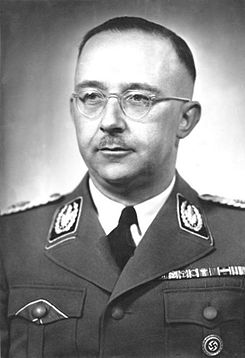



Joachim von Ribbentrop was born in Wesel, Germany, on 30th April, 1893. His parents were Richard Ulrich Friedrich Joachim Ribbentrop, a career army officer, and his wife Johanne Sophie Hertwig.
Joachim von Ribbentrop was educated at a boarding school at Switzerland he also spent time in France and England as a child. One of his former teachers described Joachim as a student who was stupid, pushy, and full of vanity.
In the late 1900s, his father got in trouble with the German Imperial Army and the family suffered financial trouble. In 1908, the family moved to Switzerland where the children studied in Arosa via private tuitions and learned English and French. During those teenage years, Joachim also caught a fascination for skiing and adventure sports.
Joachim further moved to Britain to improve his hold on English language after he became fluent in the language he lived in Europe and America for two years after that.
In 1911 Joachim von Ribbentrop began working as a clerk with a German importing firm based in London before moving to Canada where he worked as a timekeeper on the reconstruction of the Quebec Bridge and the Canadian Pacific Railroad. This was followed by employment as a journalist in New York City and Boston.
He returned to Germany at the outbreak of World War I, in which he served as a hussar on the Eastern Front. He was then assigned to the German military mission in Turkey. After being seriously wounded in 1917 Ribbentrop joined the War Ministry and was a member of the German delegation that attended the Paris Peace Conference.
Upon his return to Germany at the end of the war, Ribbentrop worked as a Sekt (sparkling wine) salesman until his marriage in 1920 to the daughter of a wealthy Sekt producer made him financially independent. Thereafter he persuaded a distant ennobled relative to adopt him so that he could affix "von" to his name.
In May 1932 Ribbentrop joined the National Socialist German Workers Party (NSDAP). Joachim von Ribbentrop quickly moved up the hierarchy and in 1933 became Hitler's foreign affairs adviser. The following year he established the Ribbentrop Bureau an organization that eventually had a staff of 300 people. After his appointment in 1934 as Reich commissioner for disarmament at Geneva, he negotiated in June 1935 the Anglo-German Naval Agreement, which authorized German naval rearmament.
Adolf Hitler appointed Ribbentrop as the ambassador to London in August 1936. His main objective was to persuade the British government not to get involved in Germany's territorial disputes and to work together against the communist government in the Soviet Union.
When Ribbentrop presented his credentials to George VI on 5th February 1937, the British were outraged when he gave the Hitler salute. He also upset the British government by posting Schutz Staffeinel (SS) guards outside the German Embassy and by flying swastika flags on official cars.
On 4th February 1938, Ribbentrop replaced Constantin von Neurath as Germany's foreign minister. Traudl Junge met him during this period: "Ribbentrop was a very odd man. The impression he made on me was of someone absent-minded and slightly dreamy, and if I hadn't known that he was Foreign Minister I'd have said he was a cranky eccentric leading a strange life of his own."
One of his very first achievements as Germany's foreign minister was to sign the Pact of Steel with Italy, which stated that both fascist countries will help each other if war breaks out.
He worked closely with Adolf Hitler in his negotiations with the British and French governments and in August 1939 arranged the signing of the Nazi-Soviet Pact. As he later pointed out: "To seek a settlement with Russia was my very own idea which I urged on Hitler because I sought to create a counter-weight to the West and because I wanted to ensure Russian neutrality in the event of a German-Polish conflict. After a short ceremonial welcome the four of us sat down at a table: Stalin, Molotov, Count Schulenburg and myself. Others present were our interpreter, Hilger, a great expert on Russian affairs, and a young fair-haired Russian interpreter, Pavlov, who seemed to enjoy Stalin's special trust. Stalin spoke - briefly, precisely, without many words; but what he said was clear and unambiguous and showed that he, too, wished to reach a settlement and understanding with Germany. Stalin used the significant phrase that although we had 'poured buckets of filth' over each other for years there was no reason why we should not make up our quarrel."
In 1940 Hitler once again began to consider invading the Soviet Union and he sent Ribbentrop to negotiate a new treaty with Japan. On 25th September 1940, Ribbentrop sent a telegram to Vyacheslav Molotov, the Soviet foreign minister, informing him that Germany, Italy and Japan were about to sign a military alliance. Ribbentrop pointed out that the alliance was to be directed towards the United States and not the Soviet Union.
Molotov already knew about the proposed German-Japanese Pact. Richard Sorge, a German journalist working in Tokyo, was a Soviet spy and had already told Molotov that Adolf Hitler was involved in negotiations with Japan. In Sorge's view, the pact was directed against the Soviet Union but it was not until December 1940, that he was able to send Molotov full details of Operation Barbarossa.
With the outbreak of the war, Ribbentrop’s importance rapidly declined. He signed the Tripartite Pact with Japan and Italy (September 27, 1940), which provided for mutual assistance against the United States, but thereafter diplomacy became a secondary concern. Ribbentrop maintained himself only through Hitler’s backing. Even this support faded after some Foreign Office personnel were implicated in the plot of July 20, 1944, to assassinate Hitler.
Following the culmination of the Second World War, Joachim von Ribbentrop was arrested in June 1945 and tried at the famous Nuremberg Trials. Despite the fact that he was only a background figure in the war, he was found guilty of war crimes, playing a role in starting the war and The Holocaust. Joachim denied having any involvement in the Holocaust and said that he was unaware of the presence of Concentration Camps until much later. But the judge held him guilty of war crimes and he was hanged on October 16, 1946. He became one of the first Nazi officials to be hanged. His last words were: "God protect Germany. God have mercy on my soul. My final wish is that Germany should recover her unity and that, for the sake of peace, there should be understanding between East and West. I wish peace to the world."
Joachim von Ribbentrop went down in history as Minister of Foreign Affairs of Nazi Germany from 1938 to 1945. He reached the height of his career by negotiating the Ribbentrop-Molotov pact with his Soviet counterpart that divided Poland, with Germany invading from the west and the Soviet Union from the east, into three zones, territory annexed by Germany, territory occupied by Germany, and territory occupied by the Soviet Union.
In 1932, Joachim von Ribbentrop joined the National Socialist German Workers' Party. It is known that before joining the party he expressed no political preferences, except the apart from fear of Communism. Besides, he displayed no anti-Semitic views and did business with them.
Like the exchange with Churchill in May 1937 suggested, Ribbentrop was an advocate of war; even though Germany was able to annex Austria and Czechoslovakia successfully through diplomacy, he regarded them as failures because he was not able to provide Germany an opportunity to deploy her military.
He played an important part in Hitler's "final solution" of the Jewish question. In September, 1942 he ordered the German diplomatic representatives accredited to various Axis satellites to hasten the deportation of the Jewish people to the East. In June 1942 the German Ambassador to Vichy requested Laval to turn over 50,000 Jewish for deportation to the East. On 25th February 1943, Ribbentrop protested to Mussolini against Italian slowness in deporting the Jewish people from the Italian occupation zone of France.
Quotations:
"My last wish is that Germany realize its entity and that an understanding be reached between East and West. I wish peace to the world."
"I know for a fact that this idea of the Jews causing the war and the Jews being so all important is nonsense. But that was Hitler's idea, and...was pure fantasy. As I say, Hitler is a riddle to me and will always remain so."
Joachim was described by the Nazi officials as a silent man who was always lost in thoughts. He possessed some negotiation skills though, which helped him first as a businessman and then as a politician.
He was not popular among other Nazi Party's comrades, some of them even disliked him. An official in the Third Reich's Foreign Ministry, Hans-Georg von Studnitz, wrote: "Ribbentrop's greatest handicap as Foreign Minister stems from the fact that as an egocentric he has failed to make himself familiar with the mentalities of other nations."
His military aide in the German Embassy in London said Ribbentrop's only policy was "the idee fixe of doing nothing that might displease Hitler."
Quotes from others about the person
"Von Ribbentrop bought his name, he married his money and he swindled his way into office." - Joseph Goebbels
Joachim von Ribbentrop met Anna Elisabeth Henkell in 1920 and got married to her the same year. She was the daughter of a wealthy businessman from Germany. Joachim had five children with her.
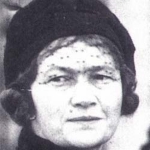
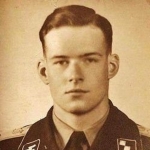
(1921-2019)
born 1935
born 1922
(1940-2018)
Born 1932
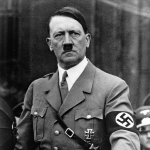
Ribbentrop once said: "I was truly under Hitler's spell, that cannot be denied. I was impressed with him from the moment I first met him, in 1932. He had terrific power, especially in his eyes."
